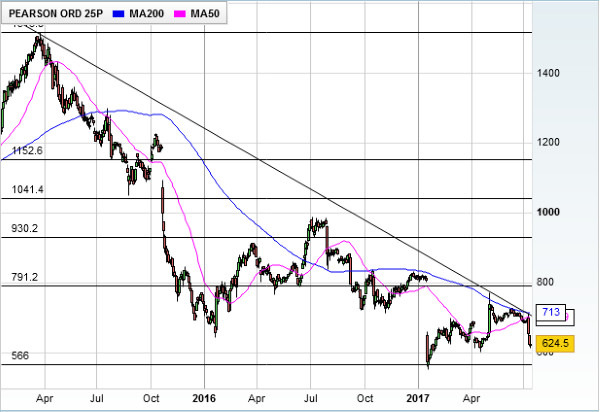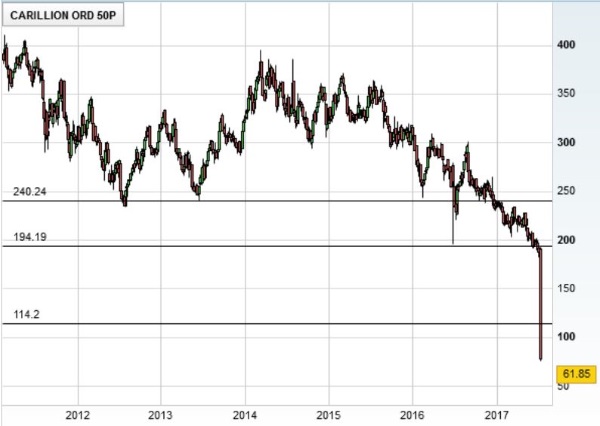Are these dog shares turnaround candidates?
13th July 2017 12:59
It's been a tough week for a number of listed companies, but troubled construction services provider sticks out like a sore thumb. And the firm, which looks a dead-cert for demotion from the FTSE 250 index, is by no means out of the woods. has had a stinker, too, and it's being tipped to go even lower.
Carillion's profits warning has been long anticipated by the army of hedge funds who'd taken out short positions on the stock since its failed takeover bid for competitor three years ago. Now, the heavily-indebted firm needs a Balfour-like turnaround to repair its reputation.
The warning came Monday – and the devastation for shareholders must was extreme by any standards. Its share price fell three days running and is currently two-thirds below Friday's closing price of 192p. They were worth as little as 51p Thursday.
A dive at education firm Pearson was less dramatic, but its shares are down 10% since Monday when it announced the sale of a 22% stake in publisher Penguin Random House (PRH) to Germany's Bertelsmann for around $1 billion (£780 million). The dividend is cut again, too.
An announcement back in October 2015 by the former Financial Times owner was the first of many profit warnings that has seen the price sink to 623p. It peaked at 1,517p back in late March 2015, so has lost almost two-thirds of its market value in the intervening two years. That's pretty poor, but illustrates how savage and swift Carillion's demise has been.
And it may not be over for either of these dogs. While there's no telling where Carillion's shares will end up – a rights issue looks nailed on – broker Liberum is calling Pearson sharply lower.

While Pearson aims for dividend cover in excess of 2 times, excluding the contribution of the PRH stake, appears prudent, it's no gone down well with investors. Analyst Ian Whittaker says a predicted full-year payout of 16-17p is two-thirds less than 2016's 52p.
"Since this would give just over a 2% dividend yield, that is likely to mean the stock loses its appeal to income funds, which held it because of its formal dividend yield," Whittaker says. "That could put pressure on the stock moving forwards."
Selling the PRH stake does not solve the underlying issues the firm faces, either; they sit within its US higher education business, which makes up around one-third of profits currently. That will be higher after the PRH disposal, as well as any sale of its US K-12 publishing business.
"Structural problems effectively driven by students refusing in greater numbers to pay very high prices for materials will put continued pressure on what has historically been a very high margin business for Pearson," adds Whittaker.
His longstanding price target of 360p implies a further fall of 40% for Pearson shares. Others are less aggressive, but still see plenty of downside.
Panmure Gordon's Jonathan Helliwell's new forecast for 2017 earnings per share (EPS) of 44p gives a price/earnings (PE) ratio of 14 times, which looks expensive, "given the depth of the structural, regulatory, and cyclical challenges the group continues to face in its core education markets".
He slashed his target price by a quid to 525p and moved from a 'hold' rating to 'sell'. This would "offer a less demanding valuation of around 12 times near-term EPS."
Carillion is a different beast, despite its solitary warning. This one has been highly anticipated in many circles and it was no surprise. It has been one of the most-shorted UK stock for years.
After this week's crash, some of those short positions have been trimmed, though it remains the most-shorted FTSE 350 share. A 10% jump today smells of more short positions being covered.

We speculated on Monday that Carillion would need a rights issue to tackle its burdensome debt pile and write-downs. Today, Jefferies analyst Sam Cullen agrees, telling The Guardian he sees "no future for Carillion without a rights issue of at least £500 million", reasoning it will find it hard to win further work with the balance sheet in its current state.
Average net debt stands at between £850 million and £900 million. Include the meaty pension deficit of £587 million and total leverage for Carillion is almost £1.5 billion – and that's before considering its £420 million reverse factoring (supply chain financing), calculates broker UBS.
Work has already begun on sorting its balance sheet, but it will be a huge struggle. A review will be presented with first-half results in September and UBS's Gregor Kuglitsch thinks the options include raising fresh equity, asking creditors to convert some of their debt into equity, asset disposals, or a combination of all three.
How much further can the shares fall? Who knows. UBS's initial target of 78p – down from its previous 185p – has been left in the dust, while Liberum's is under review.
New interim CEO Keith Cochrane is a top exec and oversaw a 142% rise in share price during his seven years in charge. But the former boss has his work cut out here.
We've got two months to wait until we hear his first report as Carillion chief. Until then, buckle up!
This article is for information and discussion purposes only and does not form a recommendation to invest or otherwise. The value of an investment may fall. The investments referred to in this article may not be suitable for all investors, and if in doubt, an investor should seek advice from a qualified investment adviser.
Editor's Picks